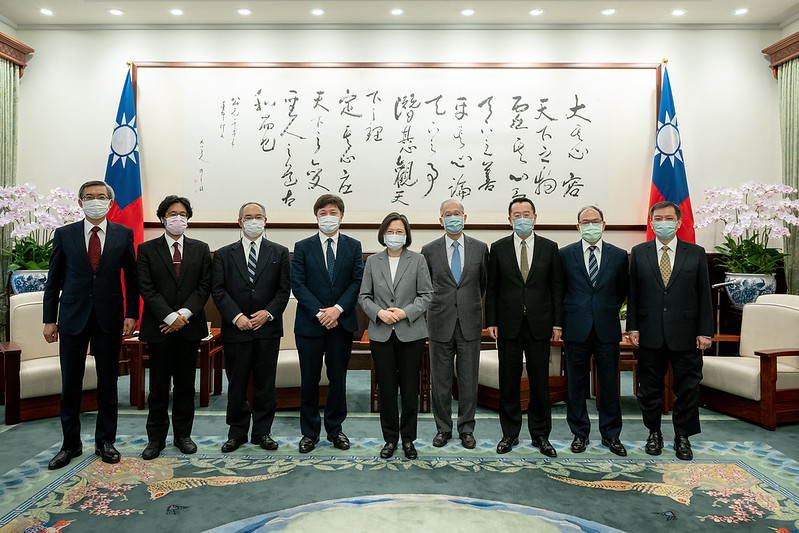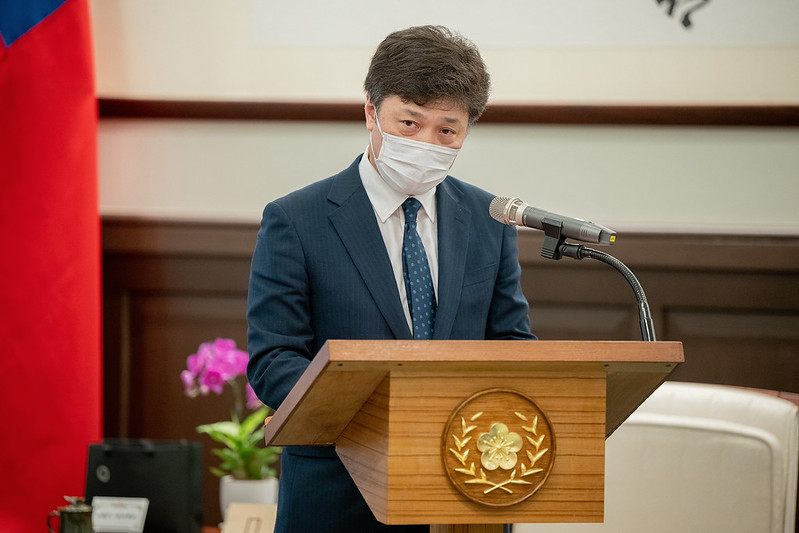News & activities
 News releases
News releases
On the morning of August 25, President Tsai Ing-wen met with a delegation from the University of Tokyo's cross-strait relations research group led by Professor Matsuda Yasuhiro. President Tsai emphasized that Taiwan's determination to defend our nation's sovereignty and protect our democracy and freedom will not change due to pressure and intimidation. The president expressed hope that democratic countries will work together to safeguard regional security and that Taiwan and Japan will continue to deepen exchanges and cooperation in all areas to jointly promote a free, open, stable, and prosperous Indo-Pacific.
A translation of President Tsai's remarks follows:
I would like to welcome Professor Matsuda, who is once again leading a delegation to the Presidential Office. Our distinguished guests here today are all academics and experts with a longstanding interest in Taiwan-Japan relations and cross-strait relations. I am delighted to meet with you all today to exchange ideas.
Taiwan studies, an academic research discipline that focuses on Taiwan, is highly challenging both as an academic pursuit and in practice. The members of Professor Matsuda's delegation have thoroughly researched Taiwan's history, politics, and economics, as well as cross-strait relations. I want to take this opportunity to express my gratitude to all of you. I hope that Japanese academics will continue their efforts so that Taiwan studies will receive more attention.
Over the past few years, Taiwan and Japan have addressed the challenges of the pandemic together, while the expansion of authoritarianism has also made us realize the importance of unity among democracies. I also want to take this opportunity to once again thank the government of Japan for emphasizing the importance of peace and stability in the Taiwan Strait at numerous important events over the past few years.
Everyone has seen that China's recent military exercises around Taiwan are a serious threat to regional security. I want to emphasize once again that Taiwan's determination to defend our sovereignty and uphold democracy and freedom will not change due to pressure and intimidation.
At the same time, as a responsible member of the international community, Taiwan will not act to provoke or escalate tensions. I hope that democratic countries will work together and jointly safeguard regional security. I also hope that Taiwan and Japan will continue to deepen exchanges and cooperation in all areas, and work together to promote a free and open, stable and prosperous Indo-Pacific.
Let me close by once again welcoming all of our visitors. The day before yesterday I received a delegation from the Japan-ROC Diet Members' Consultative Council, and with every exchange, the friendship between Taiwan and Japan grows deeper. I want to thank all of you for your concern and dedication to Taiwan-Japan relations, and wish you all the best in your research. Thank you.
Professor Matsuda then delivered remarks, and began by thanking President Tsai for finding the time to meet. The professor said that he has been unable to visit Taiwan for almost two years, and was limited to observing from afar. He briefly shared four points about his impressions after not visiting Taiwan for so long.
The first point noted Taiwan's highly successful implementation of COVID-19 prevention measures, as Taiwan initially adopted a zero-COVID policy to try and ensure sufficient time to raise vaccine coverage. Professor Matsuda mentioned that the most prevalent variant at this time is highly transmissible, but comparatively less virulent, meaning that widespread infection is hard to avoid as lifestyles return to normal. He added that from a global perspective, examples like Taiwan where a balance was found between disease prevention policies and economic development are rare. Professor Matsuda then expressed his utmost respect and admiration for the disease prevention awareness, implementation, and agility of the government and people of Taiwan.
Professor Matsuda's second point was on the importance of opening national borders. Recognizing that relaxing quarantine measures for entry is currently a major issue, Professor Matsuda mentioned that he waited over a year for a visa as a visiting scholar and that students of Mandarin from all over the world are hoping to study in Taiwan. He also pointed out that overseas academics and experts focused on East Asia would love to visit Taiwan, verify the current situation with their own eyes, and conduct surveys and exchanges. He said that Taiwan's greatest advantage is its free and open society, and that the more open Taiwan is, the greater its ability to make the most of this advantage. Professor Matsuda said that by opening its borders, including for international tourists and visitors, Taiwan can share its outstanding performance with the world.
Professor Matsuda's third point focused on Taiwan's importance to the maintenance of security. He mentioned the war in Ukraine that began earlier this year as well as the large-scale military exercises in the waters just off Taiwan that China conducted this month (August), before saying that today, the forces of democracy throughout the world are under threat. Professor Matsuda noted that countries are re-discovering the value of Taiwan and becoming concerned about Taiwan's security, but that concerns alone will not solve anything. He emphasized that of greater importance is the content of discussions between Taiwan and the United States, and among allies of the United States including Japan, and the goals and objectives that these discussions achieve. Professor Matsuda also said that the kinds of signals we send to China are very important, but in the end, the most important thing of all is that the government and people of Taiwan have the determination and capability to defend Taiwan. He added that if you lack real strength, then no amount of international cooperation or cross-strait communication will convey Taiwan's interests.
Professor Matsuda's fourth point was that bilateral relations between Japan and Taiwan have entered a virtuous cycle. He expressed his belief that Japan providing Taiwan with COVID-19 vaccines, Taiwan's application to the Comprehensive and Progressive Agreement for Trans-Pacific Partnership (CPTPP), and its easing of restrictions on the import of Japanese food products were not isolated events. Rather, he said, they were each interlinking parts in a larger virtuous cycle. Professor Matsuda noted that unfortunately, former Prime Minister Abe Shinzo, who played such a core role in this virtuous cycle, has now passed on. He expressed his admiration for the former prime minister as a great statesman who knew how to effectively implement policy, saying that his passing is truly regrettable, but we cannot for that reason allow the virtuous cycle between Japan and Taiwan to be interrupted.
In closing, Professor Matsuda stated that he has spent many years observing and studying Taiwan's political and economic affairs as well as cross-strait relations. Professor Matsuda cited a Chinese scholar from a few centuries past saying "every single person plays a part in the fate of their nation," and noted that although he is just a scholar, he hopes that this visit will benefit his understanding of Taiwan, and will serve to make the rest of the world more aware of how valuable Taiwan is.
Also present at the meeting were Institute for National Defense and Security Research Visiting Research Fellow Kato Yoichi and University of Tokyo Project Researcher Huang Wei-Hsiu (黃偉修).












